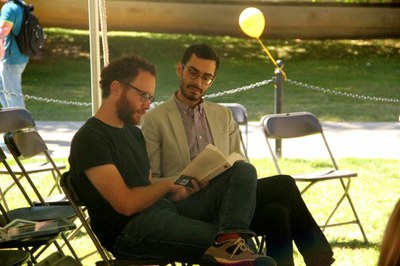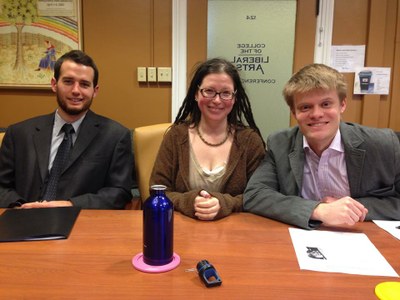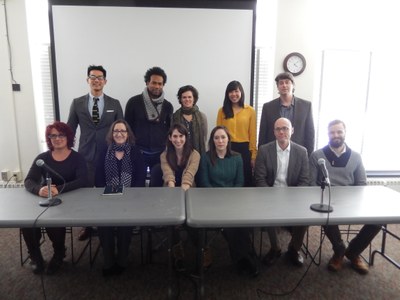CALS Support: Helping Graduate Students Stand Out

The Center for American Literary Studies offers a wide variety of support for graduate students at Penn State that helps them to mature as scholars and teachers of American literature, offers opportunities for community building and networking, and positions them to be professionally competitive in an increasingly tough academic market. The Dissertation Fellowship, for example, financially supports students as they complete their dissertations. The Summer Graduate Fellowship works similarly to fund students in the summer months, alleviating the need to teach or find other work, so that they can focus on research and writing. Smaller CALS grants allow grad students to travel to archives, libraries, and other research collections, or to attend professional training institutes where they can network with other academics in their field and gain skills that will improve their research and writing. “It is clear to me that such support is crucial to Penn State graduate students, not only in their effort to secure academic positions, but also in their pursuit of developing scholarship that advances our field,” says Robert Volpicelli, a recent graduate who received both a Dissertation Fellowship award and funds to visit a research archive. This support from CALS helped him land a coveted job with Randolph-Macon College after he completed his dissertation in 2014.

That the academic job market is difficult comes as news to few, but support from CALS has helped many Penn State grads beat the odds. Mark Sturges, a 2013 graduate, used his Dissertation Support Award to complete his project on early American nature writing before joining the faculty at St. Lawrence University in the fall of 2014. Katie Owens-Murphy, another 2013 grad, used her award from CALS to finish her dissertation, and now works as an Assistant Professor at the University of North Alabama. She revised her dissertation project into a book manuscript that is forthcoming from Northwestern University Press early next year. Almost more impressive is the way that her funding shaped her relationship not only to her research, but also to her community: “[CALS funding] afforded me the time to begin doing volunteer literacy outreach at a local prison. As a result, prison literature and outreach is now a personal and professional passion of mine. I am completing an article on the relationship between literacy and incarceration and am currently setting up programming at a nearby state prison in Limestone County, Alabama.”
Without the “space” and freedom from extra obligations that CALS funding provides, completing the dissertation on-schedule can be difficult for some. In fact, recent reports show that the time to degree for humanities doctorates is longer than any other field. Summer fellowships, especially, can give grad students an extra boost toward finishing their projects. Robert Birdwell, for example, who is now working as a post-doctoral fellow at Michigan State University, says that his summer CALS fellowship “gave me the freedom to finish a draft of my dissertation early, in time to apply for jobs during my final year of the PhD program,” which led to his current fellowship position. Recent graduate Jason Maxwell also appreciates the extra edge that his summer fellowship offered: “The CALS award gave me the space and time to develop the material in my dissertation in a way that wouldn’t have otherwise been possible. The award supported me at a crucial moment in my professional development as a scholar, and its effects can still be felt many years later.” His completed dissertation is now under final revisions before it will head off to university presses as a book manuscript.

Aside from the immediate benefit of providing time for research and writing, CALS also offers opportunities for graduate students to share their projects with others and receive feedback. Mark Sturges used support funds to travel to two different conferences where he worked on ideas that became part of his dissertation, but “more importantly,” he recalls, “CALS organized a graduate student symposium in which recipients of awards presented material from their ongoing research, and I remember this event as a valuable venue for sharing ideas with fellow grad students in various stages of preparing their dissertations and with faculty members beyond their committees.” Erica Stevens, the 2015-2016 Dissertation Fellow, had a similar experience last year. She explains that “as a CALS Fellow, I was lucky to present a chapter from my dissertation at a crucial time in the overall project’s development. Having this more formal setting to share with colleagues and receive feedback provided me with necessary practice for any future job talks.” Presenting work to colleagues early on is essential for both professional development and for sharpening the focus of research projects.
Training institutes also offer graduate students both professional skills and networking opportunities. Laura Brown used funding from CALS to attend the Rhetoric Society of America Summer Institute in 2015 where she participated in an intensive seminar on using ethnographic research methods. “The seminar gave me the practical training that I needed to conduct interviews for my dissertation, but it also prepared me to think through the theoretical and ethical challenges of using those interviews for my project. I was able to make connections with other graduate students and faculty who are pursuing similar work, which has broadened my support system as I work toward completing my dissertation,” she said. Other recipients, like Jace Gatzemeyer (2016) and Micah Donahue (2013), have used CALS awards to attend the Futures of American Studies Institute at Dartmouth College, a week-long intensive seminar that interrogates pressing contemporary questions facing American Studies as a field.

Finally, every year one graduate student serves as the Research Assistant for CALS, an essential job for the Center that also offers excellent professional training. Derek Lee, the 2014-2015 RA, calls his experience “invaluable,” noting that, “Not only did I learn about the planning, marketing, and organizing of academic events (which will be useful in the future), but I got to meet professors and writers working in all kinds of disciplines, from science fiction specialists to nineteenth-century Americanist scholars to alt-ac advocates…. It’s easy to go through graduate school only having a student’s perspective, but CALS helps you see more of the richness of academic life and how it all operates.” Michelle Huang, the 2013-2014 RA, describes her experience as similarly rewarding, especially in the connections she made with the broader Centre County community during the Community Reads project, and through contacts she cultivated while serving as the graduate assistant with the First Book Institute, where she was able to network with several early-career scholars.
CALS research and travel funding has a profoundly positive impact on the lives of graduate students at Penn State in terms of both their professional development and community relationships. This support, made possible by contributions from generous alumni, the Department of English, and the College of the Liberal Arts, helps the achievements and excellence of Penn State’s graduate students stand out among their peers at a time when the academic job market is highly competitive. The time, flexibility, and development opportunities that CALS support provides gives students the tools they need to succeed; this success benefits not just the students, but also the Penn State community as a whole.

The Center for American Literary Studies offers a wide variety of support for graduate students at Penn State that helps them to mature as scholars and teachers of American literature, offers opportunities for community building and networking, and positions them to be professionally competitive in an increasingly tough academic market. The Dissertation Fellowship, for example, financially supports students as they complete their dissertations. The Summer Graduate Fellowship works similarly to fund students in the summer months, alleviating the need to teach or find other work, so that they can focus on research and writing. Smaller CALS grants allow grad students to travel to archives, libraries, and other research collections, or to attend professional training institutes where they can network with other academics in their field and gain skills that will improve their research and writing. “It is clear to me that such support is crucial to Penn State graduate students, not only in their effort to secure academic positions, but also in their pursuit of developing scholarship that advances our field,” says Robert Volpicelli, a recent graduate who received both a Dissertation Fellowship award and funds to visit a research archive. This support from CALS helped him land a coveted job with Randolph-Macon College after he completed his dissertation in 2014.

That the academic job market is difficult comes as news to few, but support from CALS has helped many Penn State grads beat the odds. Mark Sturges, a 2013 graduate, used his Dissertation Support Award to complete his project on early American nature writing before joining the faculty at St. Lawrence University in the fall of 2014. Katie Owens-Murphy, another 2013 grad, used her award from CALS to finish her dissertation, and now works as an Assistant Professor at the University of North Alabama. She revised her dissertation project into a book manuscript that is forthcoming from Northwestern University Press early next year. Almost more impressive is the way that her funding shaped her relationship not only to her research, but also to her community: “[CALS funding] afforded me the time to begin doing volunteer literacy outreach at a local prison. As a result, prison literature and outreach is now a personal and professional passion of mine. I am completing an article on the relationship between literacy and incarceration and am currently setting up programming at a nearby state prison in Limestone County, Alabama.”
Without the “space” and freedom from extra obligations that CALS funding provides, completing the dissertation on-schedule can be difficult for some. In fact, recent reports show that the time to degree for humanities doctorates is longer than any other field. Summer fellowships, especially, can give grad students an extra boost toward finishing their projects. Robert Birdwell, for example, who is now working as a post-doctoral fellow at Michigan State University, says that his summer CALS fellowship “gave me the freedom to finish a draft of my dissertation early, in time to apply for jobs during my final year of the PhD program,” which led to his current fellowship position. Recent graduate Jason Maxwell also appreciates the extra edge that his summer fellowship offered: “The CALS award gave me the space and time to develop the material in my dissertation in a way that wouldn’t have otherwise been possible. The award supported me at a crucial moment in my professional development as a scholar, and its effects can still be felt many years later.” His completed dissertation is now under final revisions before it will head off to university presses as a book manuscript.

Aside from the immediate benefit of providing time for research and writing, CALS also offers opportunities for graduate students to share their projects with others and receive feedback. Mark Sturges used support funds to travel to two different conferences where he worked on ideas that became part of his dissertation, but “more importantly,” he recalls, “CALS organized a graduate student symposium in which recipients of awards presented material from their ongoing research, and I remember this event as a valuable venue for sharing ideas with fellow grad students in various stages of preparing their dissertations and with faculty members beyond their committees.” Erica Stevens, the 2015-2016 Dissertation Fellow, had a similar experience last year. She explains that “as a CALS Fellow, I was lucky to present a chapter from my dissertation at a crucial time in the overall project’s development. Having this more formal setting to share with colleagues and receive feedback provided me with necessary practice for any future job talks.” Presenting work to colleagues early on is essential for both professional development and for sharpening the focus of research projects.
Training institutes also offer graduate students both professional skills and networking opportunities. Laura Brown used funding from CALS to attend the Rhetoric Society of America Summer Institute in 2015 where she participated in an intensive seminar on using ethnographic research methods. “The seminar gave me the practical training that I needed to conduct interviews for my dissertation, but it also prepared me to think through the theoretical and ethical challenges of using those interviews for my project. I was able to make connections with other graduate students and faculty who are pursuing similar work, which has broadened my support system as I work toward completing my dissertation,” she said. Other recipients, like Jace Gatzemeyer (2016) and Micah Donahue (2013), have used CALS awards to attend the Futures of American Studies Institute at Dartmouth College, a week-long intensive seminar that interrogates pressing contemporary questions facing American Studies as a field.

Finally, every year one graduate student serves as the Research Assistant for CALS, an essential job for the Center that also offers excellent professional training. Derek Lee, the 2014-2015 RA, calls his experience “invaluable,” noting that, “Not only did I learn about the planning, marketing, and organizing of academic events (which will be useful in the future), but I got to meet professors and writers working in all kinds of disciplines, from science fiction specialists to nineteenth-century Americanist scholars to alt-ac advocates…. It’s easy to go through graduate school only having a student’s perspective, but CALS helps you see more of the richness of academic life and how it all operates.” Michelle Huang, the 2013-2014 RA, describes her experience as similarly rewarding, especially in the connections she made with the broader Centre County community during the Community Reads project, and through contacts she cultivated while serving as the graduate assistant with the First Book Institute, where she was able to network with several early-career scholars.
CALS research and travel funding has a profoundly positive impact on the lives of graduate students at Penn State in terms of both their professional development and community relationships. This support, made possible by contributions from generous alumni, the Department of English, and the College of the Liberal Arts, helps the achievements and excellence of Penn State’s graduate students stand out among their peers at a time when the academic job market is highly competitive. The time, flexibility, and development opportunities that CALS support provides gives students the tools they need to succeed; this success benefits not just the students, but also the Penn State community as a whole.